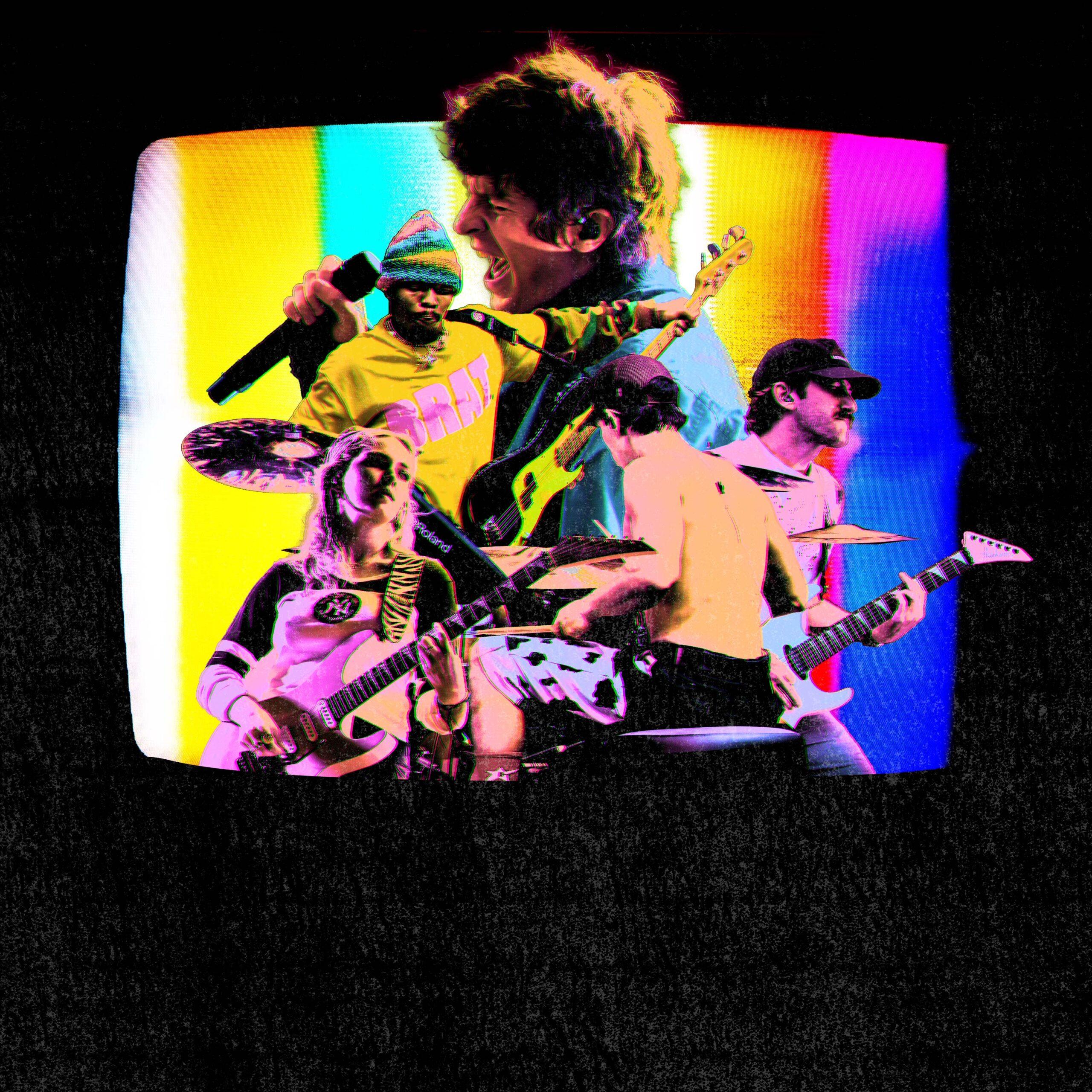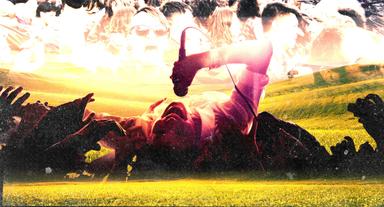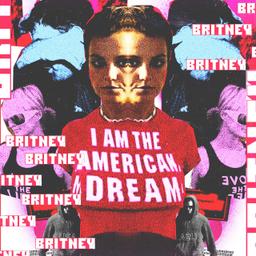
Reading about Turnstile’s fourth record, Never Enough, one could reasonably conclude that the Baltimore band had melted their guitars into a golden calf, or put a moratorium on slam dancing at their shows, or burned a statue of Ian MacKaye in effigy. They are, by many metrics, the biggest hardcore band in the world, the first to bring mosh pits to the Tribeca Film Festival and go-go beats to The Tonight Show. But with each new interview and single released leading up to the album, the slow-simmering skepticism that had long plagued the band began to boil over. Apparently, Turnstile was no longer hardcore; more horrifying still, perhaps they never were in the first place.
“turnstile is a hardcore band the same way yu-gi-oh is an anime,” goes one viral tweet—in other words, child’s play, amateur hour, meant to be outgrown (their pastel album covers and Crayola-brite music videos don’t exactly help). The band is essentially a meme on the r/Hardcore subreddit—a punching bag for all that is commercialized and compromised about the genre: “They’re gonna sell so many Baja blast freezes with this cool summer soundtrack,” one commenter sneered; another described the Never Enough single “I Care” as a “FIFA menu sounding ass song.” There’s even a pinned message at the top of the forum declaring that “Further Turnstile Posts will be removed,” lest arguments about the band tear the community apart.
It doesn’t take a hardcore lifer to see why Turnstile is a perfect target for genre purists at this point in their career. They tracked Never Enough at Rick Rubin’s Laurel Canyon studio, the Mansion, birthplace of Red Hot Chili Peppers’ Blood Sugar Sex Magik and Guns N’ Roses’ “November Rain.” Then there was the massive billboard on Sunset Boulevard announcing the record, the huge sign behind Charli XCX’s Coachella performance declaring that we were in for a “Turnstile Summer,” and the glowing profile in The New York Times anointing them as “Hardcore Punk’s Breakout Band.” There is, in other words, plenty of money and power behind Turnstile as they promote their fourth album, and the antiestablishment ethos of hardcore is fundamentally incompatible with those two things. Simple as.
These inner-scene spats have plagued Turnstile for almost their entire career. Critics unfavorably compared their 2015 debut album, Nonstop Feeling, which opens with a sample from local Maryland step squad Dem’ Raider Boyz and features quite a bit of rapping from frontman Brendan Yates, to 311 and Rage Against the Machine. The band has so far absorbed these critiques—after all, those same qualities catapulted Turnstile out of their Baltimore scene onto a major label for 2018’s Time & Space. For that record, which featured production from hardcore studio luminary Will Yip and, of all people, Diplo, Turnstile leaned even further into their eccentricities, incorporating both jazz interludes and backing vocals from Trapped Under Ice’s Justice Tripp.
Their third record, 2021’s Glow On, marked the most definitive leap forward: Opener “Mystery” sounded like nothing else in their catalog, a kaleidoscope of synthesized melodies and distorted guitars. Pitchfork awarded it “Best New Music”; the album received three Grammy nominations. For hardcore fans, this breakthrough came at the same time that their beloved scene began to escape confinement: The New York Times reported on the resurgence of the genre; Knocked Loose played Coachella. To hard-line genre formalists, Glow On created an irreparable schism—either you were into real hardcore or you liked Turnstile.
But on the other hand—so what? Turnstile doesn’t need hardcore. They’re touring the world with Blink-182 and performing at fundraisers hosted by Jack Antonoff. They have Hayley Williams (a guest vocalist on their new album) coming to their defense, writing on Instagram that “a genre is a label but community is *alive*” and calling the band “my fugazi.” Considering the relative size and stature of the factions on either side of the Turnstile-genre-treachery debate, it’s hard not to feel that the cover-up is worse than the crime. Sure, Redditors are obnoxious—water is wet. But in debating “Is the new Turnstile record hardcore?” we’ve conveniently skipped the crucial step of asking “Is the new Turnstile record good?”
Stripped from the surrounding online debate, Turnstile’s fourth album is, ultimately, stagnant. Perhaps someone more tapped in than I am would say it sounds like “Glow On’s reheated nachos,” using the same oil-and-water contrast of woozy synthesizers and overdriven guitars to diminished effect. The overwhelmingly positive critical response to the album—the breathless interviews and glowing reviews, the talk of their “cinematic” vision and “vibrant eccentricity”—isn’t really any closer to the truth than Reddit posts calling their music “girlfriendcore.” But it’s easier to attack a straw man in a Madball T-shirt and cargo shorts than it is to honestly examine Never Enough. On their new record, Turnstile is trapped between two worlds, burdened by the hallmarks of their hardcore past and frozen by their preordained legacy as crossover heroes.
Across the album, Turnstile deploys breakdowns the way their former collaborator Diplo might use a bass drop, anchoring their songs with broad, emotional peaks and reaffirming their scrappy, underground roots. Listening to Turnstile’s new album is a bit like watching Law & Order: SVU in its 26th season: The plot points might be technically new, but the climax is eerily predictable.
Choices that felt exciting on Glow On sound strangely stale here: Both albums open with just a synthesizer, which, at what feels like the exact same point in the song, is then overtaken by a distorted guitar and four-on-the-floor drum, as if to say, Now you may headbang. The syncopated grooves of “Sole” and “Dreaming” feel like shallow reflections of Glow On’s “Endless.” “Seeing Stars,” with backing vocals from Hayley Williams and Blood Orange’s Devonté Hynes, sounds like the obvious successor to Glow On’s silvery, reverberating highlight “Underwater Boi.” But where that song anchored the slippery melodies of chorus pedals with its striking refrain—“When I get to heaven will I know?”—“Seeing Stars” sputters and fades out, never quite transcending its disparate parts.
There’s a sense throughout Never Enough that Turnstile is trying to tick the boxes that sum up to a “Very Important Crossover Hardcore Record”: “Light Design” is their take on the morphed riffs of the booming shoegaze revival; “Sunshower” is there to let you know they haven’t lost their breakneck, thrash-punk bona fides. Yates’s chipper delivery on “Ceiling,” a song that forgoes guitars and drums entirely, wouldn’t sound out of place on a latter-day Imagine Dragons album. By the time “Slowdive” arrives, 12 songs into the 14-song track list, it sounds as if even Turnstile is beginning to tire of the same bulky, repetitive riffs, eager to fulfill their hardcore duties before moving on to the Weezer-esque power pop of “Time Is Happening.”
Perhaps the majority of the album feels like a series of concessions because, at its strongest moments, there are brilliant flashes of the larger-than-life, arena-sized band Turnstile clearly wants to be. “I Care” (the aforementioned “FIFA menu” music) glides along a chorus-drenched riff while Yates croons in the cleanest vocal we’ve heard from him yet, sounding not unlike a Sound and Fury version of Brian Wilson. “Dull,” coproduced by A.G. Cook, is arguably the most successful “crossover” song on the album, in large part because it carefully balances breakdowns with the gurgling synths, pitch-shifted vocals, and filtered drums that the British producer is known for.
The nearly seven-minute epic “Look Out for Me” is the album’s most ambitious bet, moving seamlessly between shimmering goth guitars and the hardcore attack of Yates screaming, “Now my heart is hanging by a thread!” The song’s second half, which features a warbling synth, the thump of a kick drum, and a sample taken from Season 4 of The Wire, is the culmination of Turnstile’s experimentation, calling back to their Baltimore roots as they depart from their hardcore origins. On these songs, we glimpse the magnetic combination of hardcore’s unblinking earnestness and the swing of disco, reggaeton, and jazz that made Glow On such a massive success. It’s unfortunate these experiments too often take a back seat to rote genre signifiers.
Turnstile would do well to take note of their Never Enough collaborators. Hayley Williams, no stranger to being at the center of genre discourse herself, transformed Paramore from Warped Tour veterans to pop-rock mainstays on 2017’s After Laughter, whose Day-Glo album cover and new-wave melodies were a definitive turn away from their post-hardcore roots. And Devonté Hynes has continuously reinvented his image throughout his musical career, transforming his sound from the dance punk of the short-lived band Test Icicles to the twee pop of his solo project, Lightspeed Champion, until finally settling in the avant R&B of Blood Orange. On Never Enough, Turnstile plays it frustratingly safe, finding the uninspired midpoint between their hardcore roots and their pop aspirations. There is a world in the not-so-distant future where Turnstile is the biggest band in America—if they could only escape the pressures of being the biggest hardcore band in America.





